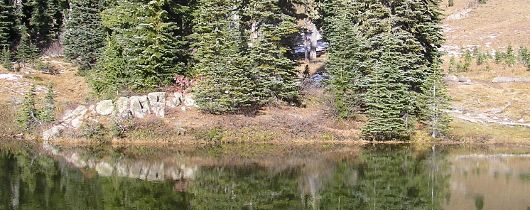Character Creation in HARP by Mark Stone
December 2016. So you're intrigued by the prospect of running in a vintage high fantasy role playing system, and your game master has offered up HARP (High Adventure Role Playing, from Iron Crown Enterprises). What have you gotten yourself into? Well, you're entering a game with a great pedigree. Before Monte Cook created Numenera, indeed even before he worked on D&D, he was a key creative force behind the Role Master system. HARP is a condensed and simplified descendant of Role Master. What's it like? The best introduction to the system is to walk through the character creation process.
Since we're talking high fantasy, we wnat to create some sort of spell casting character. In a nutshell HARP is a d100 based system that is class-based, heavily skills based, and uses conventional experience levels and fantasy races. We'll select a class, or profession as HARP calls it, then a race, then a culture. From there we'll generate some initial stats, and select skills, which will include selecting spells.
Role Master was a system with a lot of color and flair to the action, but also a lot of crunch to the mechanics. HARP aims to retain the flair while streamlining the crunch. While stats related to profession, character, profession, and skill all interact in determining outcomes, in the end most outcomes are a straight d100 roll for success or failure, or a contest roll of opposing d100s. We can further streamline things by using a character spreadsheet that does most of the calculations for us. This spreadsheet has two tabs:
- Base character stats
- Initial skills and skill levels
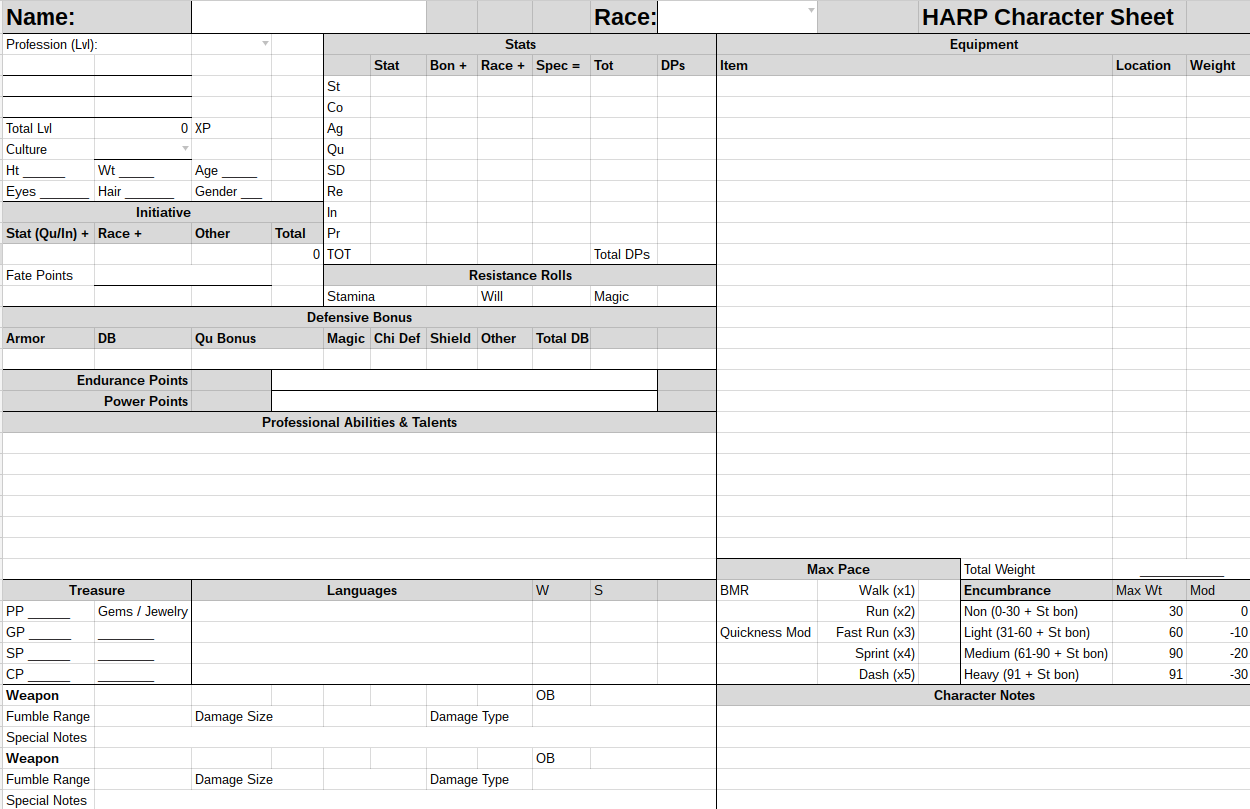
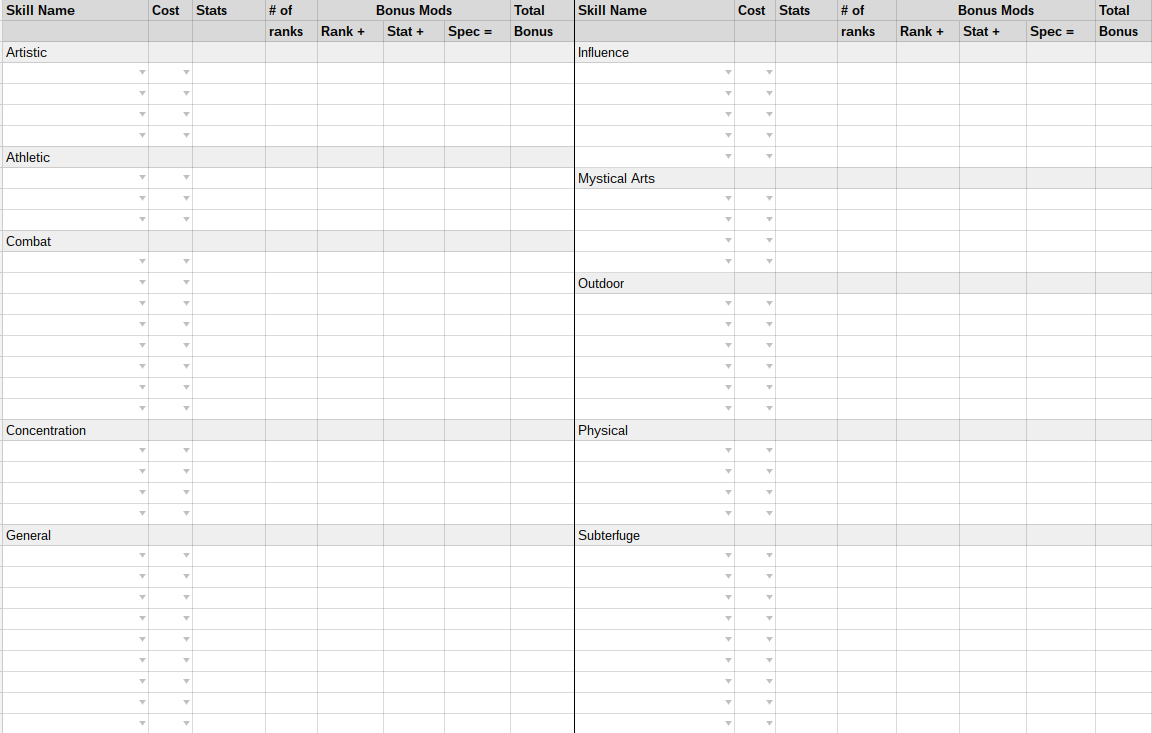
So let's think through how to optimize our spell caster a bit. Skills are purchased in skill levels, using Development Points. Skills are grouped into categories, and a category can either be standard or favored. Skills in standard categories cost 4 points per skill level; skills in favored categories cost 2 points per skill level. Players start with 80 Development Points to spend on skills. Aside from skills purchased, a character's cultural background will grant a certain number of skills for free. Character profession determines which categories are favored, and grants a number of free skill levels in favored categories. Racial bonuses may also apply, and each race has an affinity with certain cultural backgrounds. Keep in mind also that skill levels will combine with stat bonuses to determine an overall d100 success roll.
Putting all this together, we'll look for:
- A culture that gives a head start in spell casting skills;
- A race that has affinity with that culture and has complimentary stat bonsues;
- A profession that focuses on spell casting.
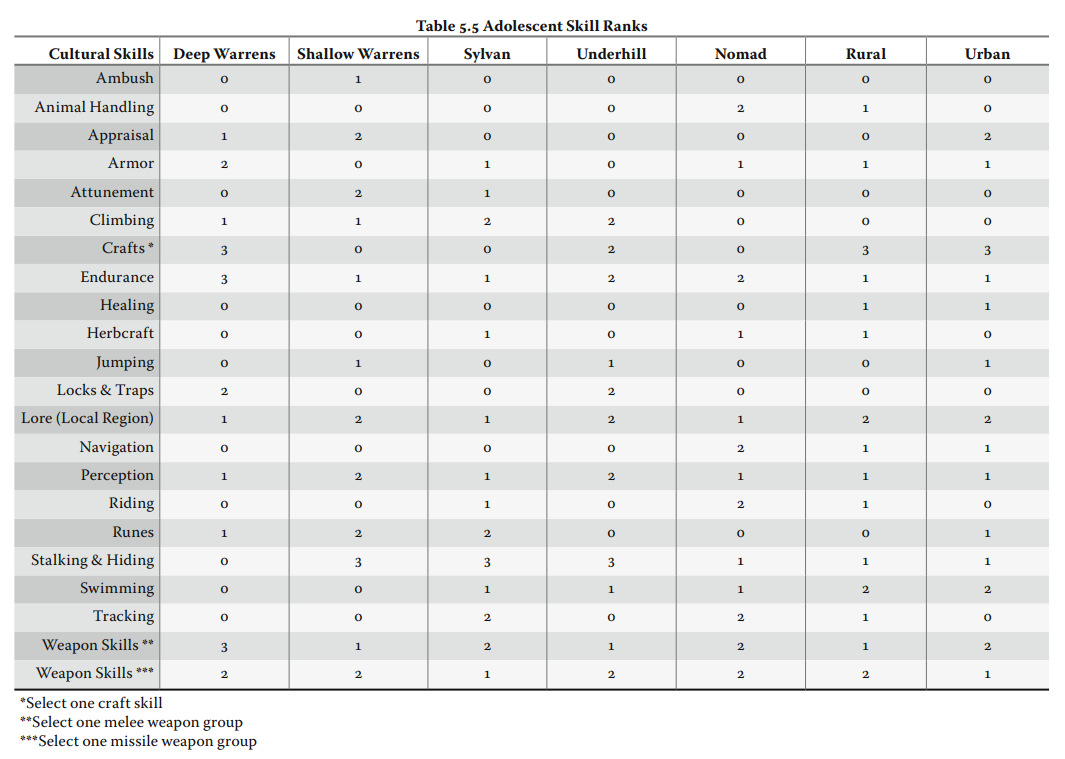
Possible cultures are: Deep Warrens, Shallow Warrens, Sylvan, Underhill, Nomad, Rural, and Urban. Magic is handled under the Mystical Arts skill category. In addition to individual spells, skills in this category include: Arcane Lore, Attunement, Power Point Development, and Runes. So we'll pick a culture that gives us the best head start in these skills. That would be Shallow Warrens, which, according to the table, gives us 2 skill levels in Attunement and 2 in Runes.
Possible races are: Dwarf, Elf, Gnome, Gryx (a generic beast-man, ogre, half-orc type), Halfling (hobbit), and Human. Of these, elves have the greatest affinity for magic, and they can be found in any culture, including Shallow Warrens. So we'll take an elf from a shallow warren background.
Looking at the Racial Characteristics table we see that elves get stat bonuses to Reason and Insight, both important to spell casting. They also have the highest natural Power Point bonus, which determines how many spells a character can cast without rest and recovery. Elves also have the highest natural magic resistance.
Elves get a few racial abilities, which will matter when we select skills:
- They have Enhanced Senses, givng them a +10 on their perception skill;
- They have Quiet Stride, giving them a +25 on their stalking skill;
- They have Night Vision.

Now we must select a class. Because HARP is a heavily skill-based system, any profession could choose to emphasize magic- related skills, and thus become a spell caster. However, the optimal way to run a spell caster is to select a profession that has Mystical Arts as a favored category, so that spells cost 2 points per skill level rather than 4, and so that they get some free skill levels in that category.
Possible professions are: Cleric, Fighter, Harper, Monk, Mage, Ranger, Rogue, Thief, and Warrior Mage. Of these Cleric, Harper, Mage, Ranger, Rogue, and Warrior Mage all have Mystical Arts as a favored category, and of these Mage gets more free levels in Mystical Arts than any other. Thus our Shallow Warrens Elf -- we'll call her Elara -- will be a mage.
Mages have the following favored categories:
- Artistic, with 2 free skill levels;
- General, with 4 free skill levels;
- Influence, with 2 free skill levels;
- Mystical Arts, with 10 free skill levels;
- Physical, with 2 free skill levels.
Now at last we turn to character stats. HARP uses eight: strength, constitution, agility, quickness, self discipline, reason, insight, and presence. Each normally has a value from 1 to 100, though values up to 105 are possible. As a mage, reason and insight will be most important. However, mages also have Influence as a favored skill category, and Influence skills rely on both presence and insight. Given that the burlier members of a party often overlook the value of presence when doing character generation, putting some development into presence makes sense.
In HARP you have 550 points to "spend" on stats. Stats from 1 to 90 are purchased one for one, and stats above 90 cost progressively more points to buy.
The spreadsheet will help you here; all point costs are calculated and totaled for you. So feel free to play around with different options, paying particular attention to where a change in stat yields a change in bonus. It's the bonuses you'll care about more than the raw stats, because bonuses are applied as modifiers to your skill levels.
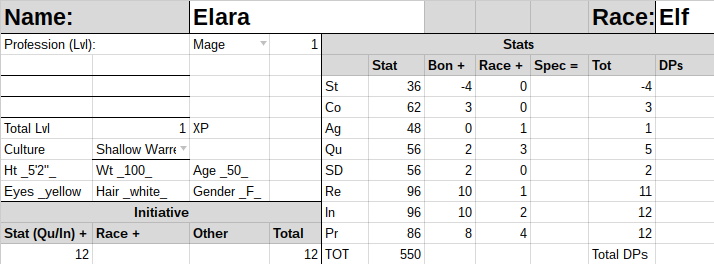
Strength matters least to a mage, so we allow negative strength modifier (-4) and set strength to 36. Constitution bonuses stack with the Endurance skill to determine Endurance Points, which are HARP's equivalent of hit points. So we need at least a modest constitution bonus; mages won't end with a lot of endurance points, but we can't ignore combat durability entirely. A constitution of 56 gives a +2 bonus. Agility matters little to mages, but elves have a natural plus here, and it makes no sense to undermine that. An agility of 48 is bonus neutral, and we still pick up the +1 racial bonus. Quickness is one determinant of initiative, and even a mage benefits from initiative in combat. So again, a 56 gives us a +2, which stacks with the racial bonus of +3 for an overall +5. Self Discipline is relevant to some magical effects and resistance rolls, and is the other bonus that stacks with constituion in determining endurance points. So we'll put this higher than quickness, raising it to 62 to get a +3 bonus. Reason and Insight are the two key mage stats; putting each at 96 is expensive, but the bonuses here factor into most mage actions, so the investment is worth it. That leaves us with 86 points for Presence, good for a +8 bonus; since elves have a +4 in presence this means that the overall +12 bonus will be as high as any other stat bonus for Elara.
Our spreadsheet automatically derives some additional information for us based on these stats. Elara's initiative is 17; skills will not modify this further. Right now resistance rolls are:
- Stamina - 9
- Will - 11
- Magic - 44
Each of these is a skill, however, and we haven't purchased any skill levels yet so these can go up. Similarly, Elara currently has 25 endurance points, but has yet to purchase endurance skill levels, so that number could go up.
You'll notice an entry for Fate Points, and a starting value of 3. A character can have up to 5 Fate Points, and they can be purchased either initially or when leveling up for 5 development points per Fate Point. These Fate Points can then be cashed in, at the player's discretion, in advance of a particularly crucial skill check to add a substantial bonus towards the chance of success. We'll leave Elara with just her starting 3 Fate Points, preferring instead to focus development on skills.
Which brings us to the final step in character generation, selecting skills and skill levels. Some constraints to note:
- At first level, Elara is limited to at most 6 skill levels in any given skill;
- We have a number of skill levels in favored categories that are free, and also some skills and levels based on culture that are free;
- Beyond those free skill levels, a starting character has 80 development points to spend on skills. Remember that skills in favored categories cost 2 points per skill level, and that skills in standard categories cost 4 points per skill level;
- Finally, each spell that Elara knows is a skill; we'll need lots of development points for starting spells.
Looking at the Skills tab of our spreadsheet, we can see that favored categories have automatically been marked with the number of free skill levels available in those categories. In addition, we've entered the skill levels for cutlure-based skills, and marked skills where class or racial modifiers are relevant, although we've yet to select any skill levels.
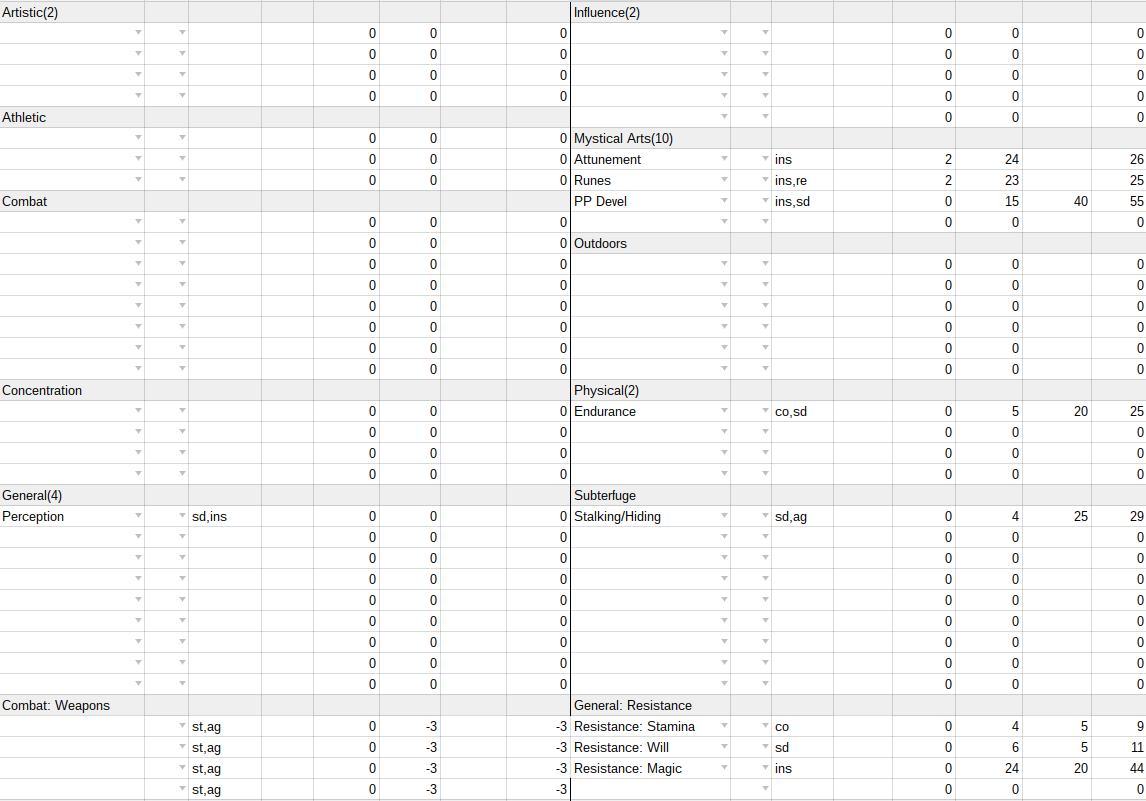
The first step, then, is to spend our free skill levels.
We get 2 Artistic skill levels, so we'll take 2 levels of Story Telling, which works well with being the high Presence voice of the party.We get 4 General skill levels, and we already know we want at least one level each in Perception, and each of the three Resistance skills. Wet 2 Influence skill levels; any of these skills could be useful, so we'll take one level each in Charm and Leadership. We get 2 Physical skill levels, which we'll put into Endurance; this will raise Elara's endurance points to 35. In Mystical Arts we get 10 skilll levels. We'll put 6 into Power Point Development, which is the maximum we can put in at first level, And we'll raise Runes from 2 to 6.
We're now down to the 80 development points all first level characters have to spend. Almost all of these will go into spells. However, we should consider whether there are skills in non- favored categories we want.
We should have a weapon skill, even though Elara hopes never to have to use it. So we'll take one level of Dagger. This gives Elara a dagger skill of 2; not much, but it at least allows her to roll a combat attack. We'll also boost Endurance to 6, because endurance points are so important. This raises Elara's endurance points to 55. We should also take one skill level in Stalking and Hidint, so that Elara can take advantage of her racial bonus in this skill. That's a total of 16 development points used, leaving 64 points to use on spells.
Let's quickly sketch how spells work in HARP. All spells require both a gesture and vocalization; inability to do either prevents spell casting. Spells have a power point cost; a caster must have enough power points available to cast the spell. Additional power points can be used to scale spell effects. A few spells are instantaneous, but otherwise spells require one round to cast for every 5 power points used in the spell. Additional casting time can be used to add a bonus to the skill roll for casting the spell. A character cannot expend more power points (including scaling options) than they have ranks in a spell, and a character must have at least as many skill ranks as the base power point cost in order to even attempt casting a spell.
Spells are either utility spells or attack spells. Utility spells are a simple skill check that either succeeds or fails. Attack spells must have a successful skill check and must beat the target's resistance roll.
Spells are organized into spheres, with one sphere associated with each spell casting profession. There's also a universal sphere. A spell caster can only learn spells from either their universal sphere or their profession's sphere; a character from a non-spell casting profession could only learn spells from the universal sphere. Elara, then, will choose spells from the universal sphere and from the mage sphere.
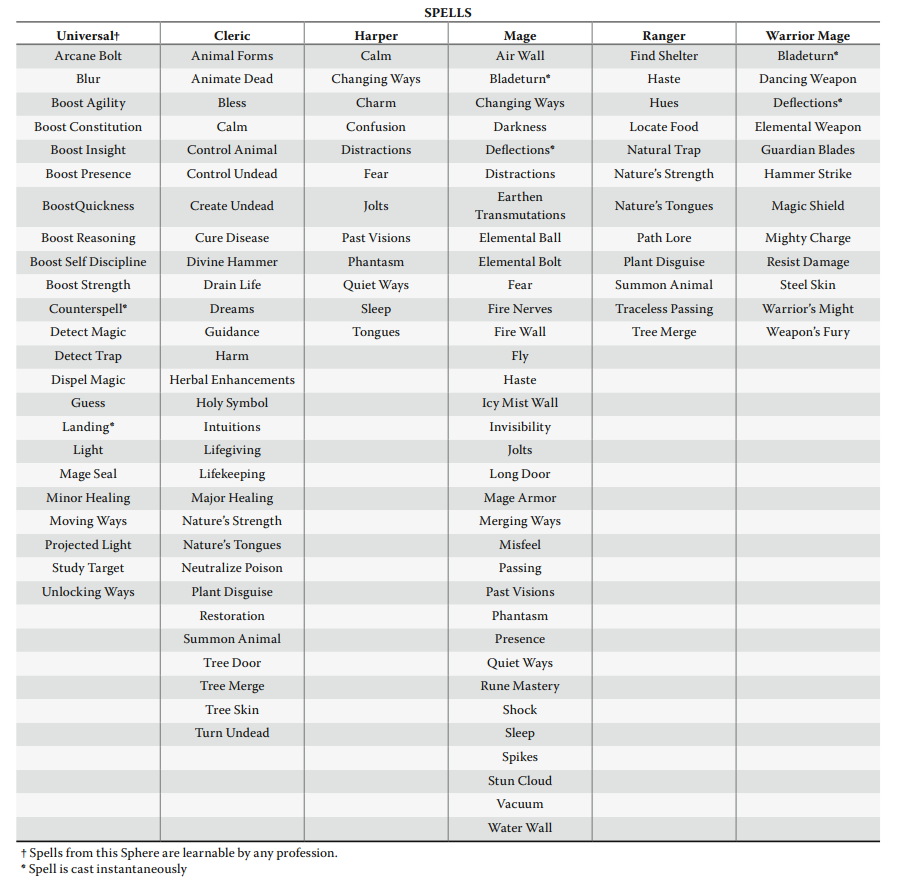
For Elara's universal spells we'll choose:
- Arcane Bolt. Basic magical ranged attack that every spell caster should have. Requires 3 power points and skill levels; we'll take 6 levels.
- Boost Strength. Helps beef up the fighters in a party pre-melee. Requires 4 power points and skill levels; again, we'll take 6.
- Counterspell. Another fundamental spell that all spell casters should have, and have to the max. Requires 1 power point / skill level, but we'll take 6 levels.
- Detect Magic. Requires 4 power points / skill levels. We'll take just 4, since this will seldom be cast in a melee situation, and Elara should be able to take extra casting time to improve her chances.
- Dispel Magic. Requires 3 power points / skill levels; we'll take 6.
- Light. No party should venture under ground unless the mage can cast light. Requires 6 power points / skill levels.
- Minor Healing. Not a central spell for a mage, but it's always good to have a little healing available. Requires 3 power points / skill levels, and that's all we'll take.
Thus far we've used 37 more development points. That leaves 27 points for spells in the mage sphere. Here we'll take:
- Bladeturn. A good defensive spell that reduces a hand to hand attack's skill roll by 25. Requires 6 power points / skill levels.
- Deflections. A defensive spell like Bladeturn, but for ranged attacks. This requires 6 power points / skill levels, which is more than Elara can get at first level, but we'll invest 1 skill level here to put the spell within reach once she levels up.
- Darkness. Another highly useful basic spell. Requires 6 power points / skill levels.
- Elemental Ball - Fire. Foundational ranged area of effect damage spell. Could also be learned for Water, Earth, or Air, but Elara will take Fire. Requires 6 power points / skill levels.
- Elemental Bolt - Fire. Like Elemental Ball, but targeted rather than area of effect. Requires 5 power points / skill levels, and that's what we'll spend.
- Fly. Requires 4 power points / skill levels, and we only have 3 points left, so we'll invest 1 skill level to bring down the cost after leveling up.
- Rune Mastery. Requires a whopping 8 power points / skill levels. We'll spend our last 2 development points here, bringing this spell within reach in the future upon leveling up.
So there you have it. Elara is a first level elf mage who can cover all the basics with an orientation towards combat: she can detect, dispel, and counter magic, she can cast light and darkness, she has some defensive and healing spells, she can boost the attack of others, and she can do some ranged magical attacks of her own, both targeted and area of effect. She's laying the foundation for more advanced spells at higher levels. All in all a very conventional high fantasy spell caster.
The final character sheet for Elara is online here.
Rendered in HARP, there's a lot of calculation that goes into how each spell and indeed how each skill functions, but thanks to our spreadsheet most of that calculation is done automatically. What remains is a simple system of d100-based skill checks, where each check is either a straight success or fail, or else a check against a target's resistance. We get all the rich flavor of high fantasy, concisely expressed.
